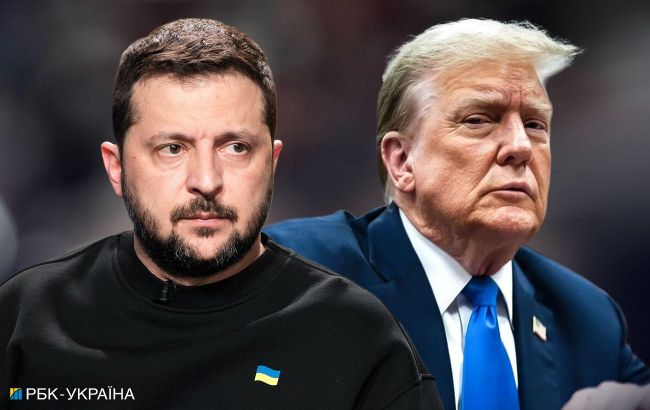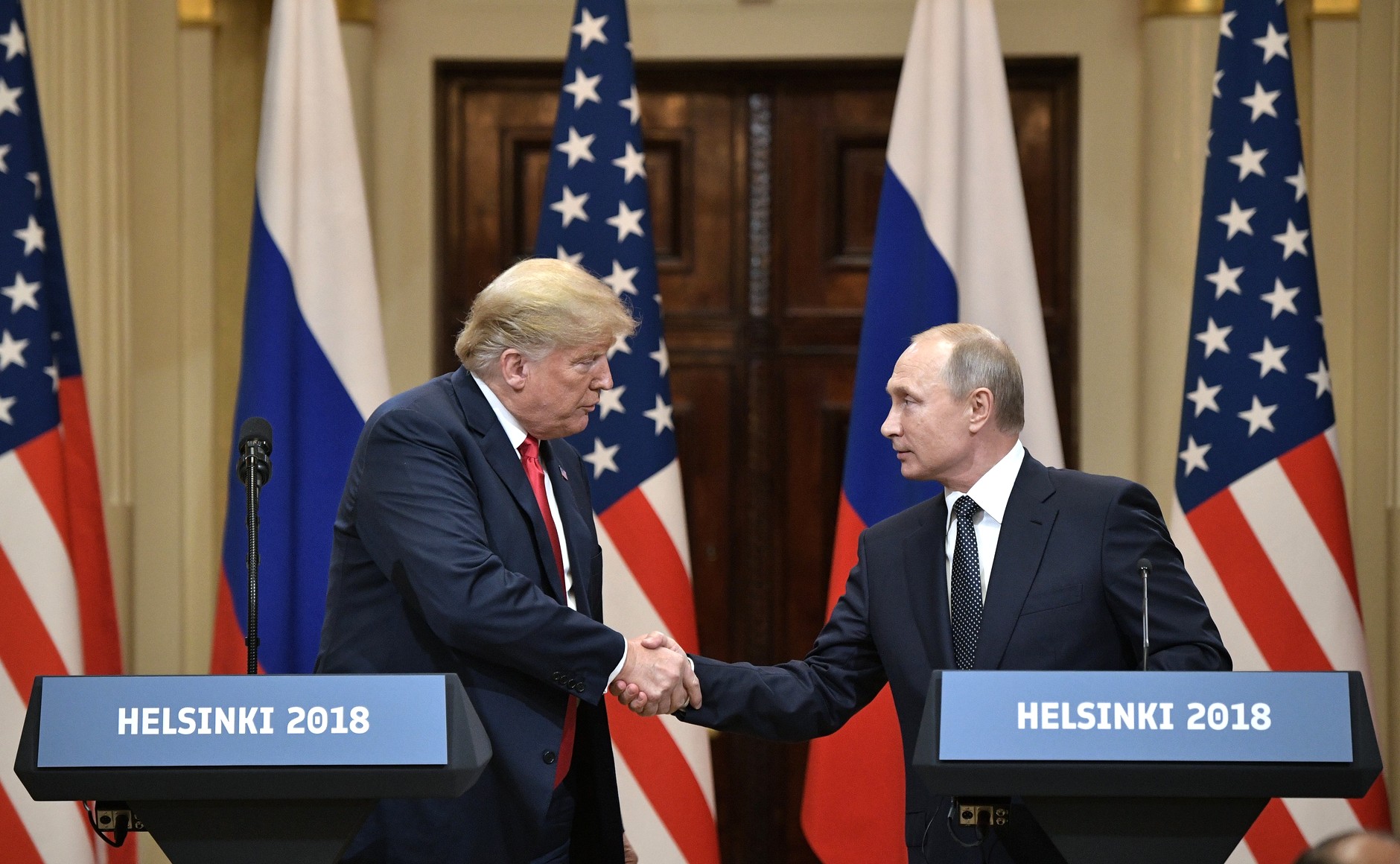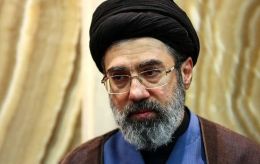Still Putin's pal? Has Trump changed his stance on Ukraine and war
 Volodymyr Zelenskyy and Donald Trump (photo: RBC-Ukraine collage)
Volodymyr Zelenskyy and Donald Trump (photo: RBC-Ukraine collage)
Donald Trump did not begin to disrupt the United States' allocation of aid to Ukraine. But it is very imprudent to write him down as a friend of Kyiv. As before, it is still impossible to predict what his actions will be regarding the Russian-Ukrainian war if he wins the elections. For more details, see RBC-Ukraine's article.
Today, April 24, the story of the provision of American aid to Ukraine ended happily. The upper house of the US Congress, the Senate, held the final vote, and the bill on the allocation of aid to allies abroad went to Joe Biden for signature and will soon enter into force.
American media reports that the Pentagon has already formed packages of weapons for Ukraine, and they are not overseas, but already in Europe. So, there are only a few days left before the use of American equipment and shells on the battlefield.
A few weeks ago, such a positive result looked very doubtful. It is believed that several factors helped Ukraine. First, Iran's attack on Israel actualized the topic of support for American allies facing the aggression of authoritarian regimes. Secondly, Speaker of the House of Representatives, Mike Johnson, who, after many months of procrastination, personally took up the promotion of the aid package for Ukraine, Israel, and Taiwan.
But, perhaps, the main guarantee of the final success is the passivity of Donald Trump, who did not oppose the approval of aid to Ukraine. According to the American media, his pro-Ukrainian fellow party members feared until the last moment that the ex-president of the USA would write some harsh post urging them not to vote for aid to Ukraine - and then all their efforts would be in vain.
But a couple of days before the vote in the House of Representatives, Trump, on the contrary, reluctantly recognized the importance of supporting Ukraine for the interests of the United States, and already after the vote, he praised Speaker Johnson, calling him a good man.
Trump and Ukraine: History of unpleasant relations
Ukraine occupies a difficult place in Trump's world, notes The Wall Street Journal. It is about the fact that the ex-president has very unpleasant memories associated with Ukraine: in particular, his active participation in Ukrainian affairs led to the imprisonment of his political technologist Paul Manafort. Trump accused Ukraine of trying to interfere in the 2016 presidential election, although in fact, it was Russia.
It was on this occasion that Trump made comments in 2018 that are still remembered today: after meeting with Vladimir Putin in Helsinki, he made it clear that he trusted the Kremlin's master more than his intelligence, which pointed to Russian involvement in the US election.
Trump has previously expressed sympathy for the Russian president (for example, calling him "a better leader than Obama"), and on the eve of the full-scale Russian invasion of Ukraine (he called Putin's actions in Donbas "genius"), and even after the start of a major war (Trump again declared that Putin is more trustworthy than American intelligence).
But the most important thing is that it was because of Ukraine that Trump was impeached for the first time during his term of office - as a result, his attempt to persuade Volodymyr Zelenskyy, at that time the newly elected president of Ukraine, to investigate Joe Biden's son, Hunter, led to this.
As a result, Trump took revenge on Ukraine, which caused him as many problems as he could, for example, contemptuously recalling the all-consuming Ukrainian corruption or refusing support in the fight against Russian aggression.
But what is more important now is how Trump sees future relations with Ukraine in the event of his re-election as president (although Biden has recently risen in the ratings, Trump's chances still look a little better).
The problem is that Trump himself in this regard limits himself at best to vague hints about ending the war in 24 hours and boasts that under his presidency full-scale Russian aggression would not have happened at all, without going into any details.
Some more details were reported by representatives of the Trump team, on condition of anonymity. In particular, Trump allegedly developed the following plan: to weaken Ukraine as much as possible, without helping it, so that after his inauguration, in early 2025, it would be as compliant as possible and ready to make concessions to the Russians, including territorial concessions. And for Moscow, Trump allegedly had another argument prepared - if the Kremlin did not agree to peace, then Trump, on the contrary, would sharply increase the amount of aid to Ukraine.
 Meeting of Donald Trump and Vladimir Putin in Helsinki (photo: kremlin.ru)
Meeting of Donald Trump and Vladimir Putin in Helsinki (photo: kremlin.ru)
Indirectly, this plan was confirmed by Trump's son, Donald Trump Jr., at the height of the story with the allocation of aid to Ukraine. He sharply criticized the relevant bill, stressing that it damaged his father's ability to negotiate an end to the war between Ukraine and Russia. De facto, Donald Trump Jr. confirmed that Donald Trump Sr.'s idea is for Ukraine to remain without American aid and eventually agree to whatever conditions he would impose on it.
Donald Trump Jr. had previously stated directly that it was the only possible way to bring Ukraine to the negotiating table. If this was contrary to his father's views, such statements would not have been made.
"Yet Trump wants Congress to block it. Why? This is the part that nobody understands. Unlike his son, Trump himself rarely talks about Ukraine, because his position isn’t popular. Most Americans don’t want Russia to win," a well-known columnist Anne Applebaum wrote at the end of February in her article for The Atlantic.
Aid to Ukraine: Why Trump did not intervene
Why did Trump not dare to disrupt the allocation of aid to Ukraine? In this regard, there are already many theories in the Western media, including quite exotic ones.
Thus, the WSJ writes that a large role was played by the provision of financial assistance to Ukraine on credit, and not on an irrevocable basis. Trump's entourage allegedly talked about the fact that Ukraine is a potentially rich country that will be able to pay off its debts by using its natural resources, which, in turn, are now located on the lands occupied by Russia (and in this logic, Ukraine should be helped to free them).
The concept certainly seems very far-fetched. But at a briefing in Kyiv in mid-March, at which RBC-Ukraine was present, Republican Senator Lindsey Graham, who is considered close to Trump, paid a disproportionate amount of attention to considerations on this topic. Such an argument sounded in the discussions in the ex-president's circle.
However, it is more likely that Trump's opinion was influenced, for example, by Polish conservative president Andrzej Duda, who recently met with him. Duda is respected by Trump and at the same time is an ardent supporter of aid to Ukraine.
Speaker Mike Johnson, who visited Trump's residence a few days before the vote, presented several arguments to the ex-president. In particular, there is information that the opinion of Johnson, a devout Protestant, was influenced by the stories of his co-religionists from Ukraine, who described all the sufferings of the Ukrainian people and the systematic persecution by the Russians of all Christians who do not belong to the Russian Orthodox Church.
But from a practical point of view, it is worth considering first of all the electoral considerations that could drive Trump. Despite his confident victory in the Republican primaries, he could not win the sympathy of all party members. On the contrary, according to various polls, almost the majority of Republicans who supported the pro-Ukrainian candidate Nikki Haley in the primaries intended to vote not for Trump, but for his opponent Biden. And if Trump were to cut aid to Ukraine as a result, it would be more difficult for him to win their sympathy in the time remaining before the vote. According to many estimates, the outcome of the presidential election will depend on this category of Republicans.
In any case, a combination of various factors ultimately allowed Ukraine to receive the long-awaited American aid and thereby more or less strengthen itself for the next few months. Just in time for the presidential election in the USA, which for now ends the real horizon of planning not only in Ukraine but also in Europe and in the USA itself.
"Trump himself does not yet know what exactly he will do with Ukraine," a well-informed top Ukrainian official told RBC-Ukraine some time ago. After the story of the allocation of American aid, there was no more clarity.



